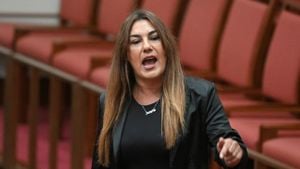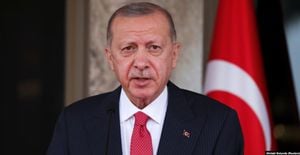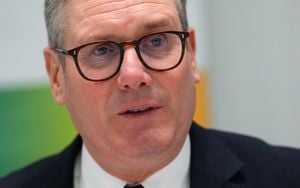Venezuela, long embroiled in political chaos, saw renewed demonstrations this week as citizens took to the streets to voice their anger against what they viewed as the fraudulent re-election of President Nicolás Maduro. This uprising was marked by heightened tensions as opposition leaders like María Corina Machado, regarded as the nation's 'Iron Lady,' mobilized supporters who put their safety on the line, facing threats of violence and arrest.
The conflict escalated dramatically following the announcement by the country's National Electoral Council (CNE) declaring Maduro the victor of the July presidential elections. Contrary to this claim, opposition figures contest it fiercely, asserting their chosen candidate, Edmundo González, rightfully won the election with nearly 70% of the votes, based on evidence collected from polling stations across the country.
"We Venezuelans did everything the international community asked of us," Machado recently lamented, highlighting the stakes involved. Nearly 2,000 individuals have reportedly been imprisoned since protests erupted following the election. Opponents of the regime are facing increasingly brutal repression, with reports of deaths and forced disappearances among their ranks. This unrest shed light on the dire human rights situation as activists and organizations, including Human Rights Watch and Foro Penal, brought attention to the suppressed voices of many who have dared to speak out.
Adding to the volatility, the death of Edwin Santos, who was prominent within the opposition, has sparked outrage and renewed demands for accountability from authorities. Critics assert the government is increasingly turning to heavy-handed tactics to maintain its grip on power.
Venezuela's socio-political crisis has been exacerbated by Maduro's historical refusal to cede power, relying heavily on the military to enforce his rule. Political tensions have led to widespread instability, glaring corruption, and economic disaster, with inflation rates skyrocketing and basic necessities remaining beyond reach for ordinary Venezuelans.
Machado, who has been forced to live clandestinely since the election, has not only rallied support at home but has also called upon international leaders, including President Trump, to reconsider their approach toward the Maduro regime. She urged for re-imposition of sanctions and pointed out the conditions under which the U.S. could gain from aiding her cause. "An enormous foreign policy victory is at stake," she argued, emphasizing how Maduro's government is growing weaker by the day.
October saw the release of 107 detainees originally arrested during the protests triggered by accusations of election fraud. This move followed enormous public pressure and outcry over severe human rights violations. Footage of jubilant families reuniting with loved ones circulated across social media, showcasing the continued resilience of the public amid government crackdowns.
Despite these releases, data from Foro Penal indicates nearly 1,963 political prisoners remain incarcerated, with thousands still awaiting their fate. The opposition is urging for systematic changes and greater transparency to restore democracy, raising calls for foreign intervention to guarantee citizens' safety.
The challenging circumstances faced by Machado and other opposition leaders expose the inherent risks of standing against autocracy. Many of them are followed and threatened regularly, forcing them to navigate their political aspirations with extreme caution. While Machado, supported by international allies, has maintained communication with foreign nations, the future for Venezuela remains uncertain as the struggle escalates.
International responses vary, with some viewing Maduro's regime as increasingly unsustainable due to the pressure being applied at home and abroad. The prospect of political changes within U.S. leadership may shift prioritization and approaches toward regimes like Maduro's, potentially complicity or strengthening opposition efforts based on how policies adapt.
Through these trials, opposition leaders like Machado continuously rally support by voicing the struggles faced by everyday citizens, ensuring their plight does not go unnoticed. The time is ripe for global leaders to respond, following the distressing patterns of political abuses witnessed, to support Venezuelans' call for democracy, safety, and justice. The stakes are undeniably high as the world watches the continuing evolution of this tumultuous situation.



